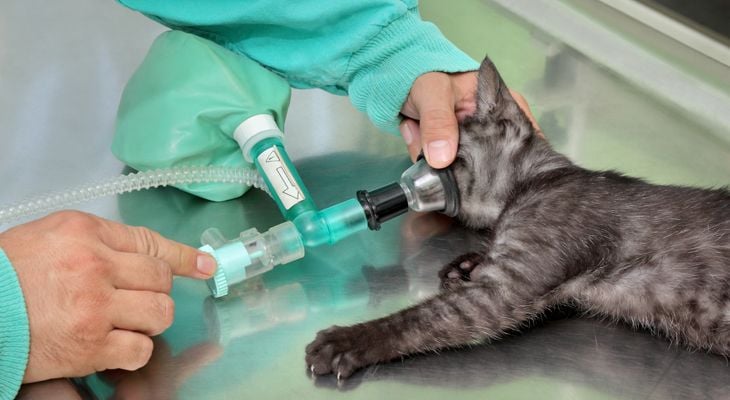
It’s an unfortunate fact that most cats don’t relish a trip to the vet. For this reason, sometimes they need to be sedated—both for their own and the veterinarian’s safety—during even relatively simple procedures. Anything from dental care to a major surgery may require anesthesia. Some especially high-strung cats even need to be unconscious for standard, noninvasive procedures, such as changing bandages or examining ears.
Anesthetic agents may be injected under the skin, inhaled or administered intravenously. Some are local—anesthetizing only a limited area—while others render the cat unconscious. Your feline veterinarian will recommend the type of anesthesia that is appropriate, depending on the procedure and your cat’s personality.
Local Anesthesia
Just like in people, local anesthesia blocks pathways between the anesthetized area and the brain, so the patient feels no pain. Your vet may apply local anesthesia topically, in the case of a wound, or inject the agent into the area to be treated. This procedure usually starts with a mild, calming sedative. Suturing, cleaning wounds and removing small tumors are examples of procedures requiring injectable local anesthesia. Depending on the medication used, effects typically last 10-30 minutes. Since cats are very sensitive to anesthesia, your vet will try to use the lowest dose possible.
General Anesthesia
For general anesthesia, the vet first injects the cat with a sedative and then follows this up with a drug that causes a deep sleep. The vet inserts a tube into the cat’s trachea so that it will still receive enough oxygen while unconscious. The cat inhales anesthetic gas throughout the procedure. The veterinary staff constantly monitors the cat’s heart rate, pulse, mucus membrane color, jaw tone and reflexes. Pulse oximeters, which measure the blood’s oxygen content, are also commonly used.
The staff also monitors the cat post-operation. Usually the cat is back to normal within an hour. However, sometimes the veterinary hospital will want to keep a patient overnight for further observation and care.
Vets and Anesthesia
All licensed veterinarians are trained to safely administer anesthesia. In smaller practices, the veterinarian and his or her staff monitor the cat’s stability while under anesthesia. In larger veterinary hospitals, an anesthesia specialist may be on staff to oversee all anesthesia issues.
Safety
While anesthesia is generally safe for humans and cats, there are some rare cases where the patient dies from anesthesia or a related complication. This is more common for cats than for dogs. According to a study published on the NIH website, about one in 895 healthy cats die in an anesthesia-related incident. Risk factors include advanced age and being overweight. Monitoring with a pulse oximeter may decrease these risks.
Many pet cats will require anesthesia sometime in their lives. Call us today to discuss your concerns about your cat’s care, including issues related to anesthesia. We’ll be happy to find the safest way to treat your cat’s health problems.
